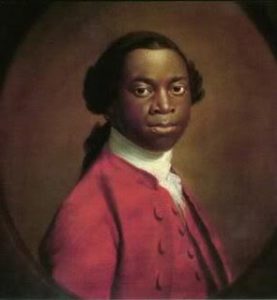Read the Following Selection
Read the following selection, or click on the play button below to listen aloud.
Black Loyalists
In 1775, war broke out in the country now known as the United States. The conflict was between the British and the Americans. The British promised land in Canada to all the black people who fought on their side. These people became known as the Black Loyalists.

Thomas Peters, Black Loyalist Soldier and one of the “Founding Fathers” of the Nova Scotian Settlers
Freedom and a Farm
Life was very hard for black people living in the United States in the late 1700s. Many were slaves. Those who were not slaves worried about being sold into slavery by sly traders. All black people faced discrimination because of the colour of their skin. It was difficult for them to find good jobs or places to live.
When the American Revolutionary War broke out between the Americans and the British, many black Americans saw it as an opportunity to make a big change. The British side not only offered them a farm in Canada but also promised them their freedom.
Heading to Canada
The Black Loyalists stayed loyal to the British side and fought in their army. They battled bravely, but the British side lost. Britain quickly arranged for the Black Loyalists to leave the United States because many were being captured into slavery.
The British gave the Black Loyalists certificates that showed they were free, not slaves. About 3,500 black people sailed north to Canada’s Maritimes. Approximately half of the Black Loyalists settled near Shelburne, Nova Scotia.
Birchtown
This settlement in Nova Scotia became known as Birchtown. The name comes from Brigadier General Samuel Birch, a British official. He helped many Loyalists leave the United States.
For the first few years, Birchtown was the largest free African community outside Africa. Today, you can visit the Black Loyalist Heritage Site in Birchtown to find out more about the Black Loyalists.
More Discrimination
Sadly, even in Canada, the Black Loyalists faced discrimination. When the American Revolution ended, many people—blacks and whites—flooded into Nova Scotia. There was not enough food for all these newcomers to eat or enough places to stay. The Black Loyalists were discriminated against and beaten up, just because of their skin colour.
As for the promise of a farm, some Black Loyalists waited six years before they received any land. Then they received only a tiny piece of land, much smaller than what they had been promised. The land was often rocky and far from the nearest town or water.
Many Black Loyalists found Canada bitterly cold. Some left and sailed to Africa. Others moved elsewhere in Canada in hopes of finding better conditions. But many of the Black Loyalists stayed in Nova Scotia and New Brunswick. Today, lots of families in the Maritimes can trace their ancestors back to these brave people.
Now, show what you know!
Complete some questions about the reading selection by clicking “Begin Questions” below.









